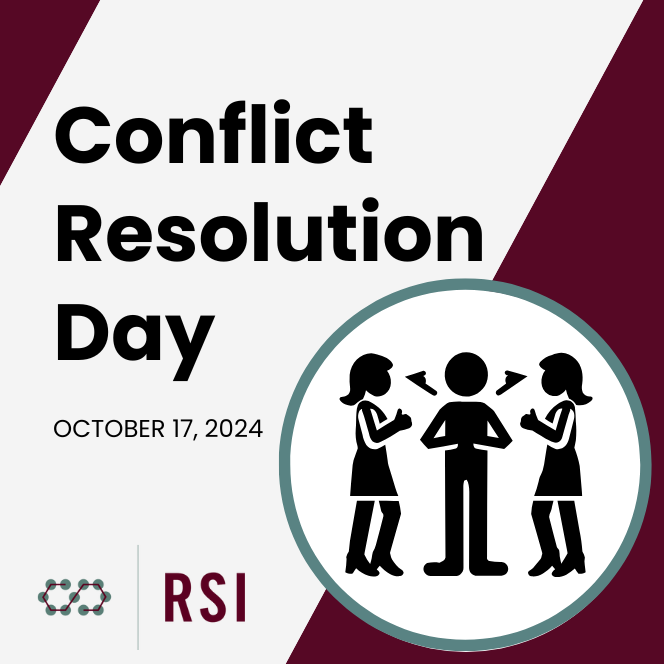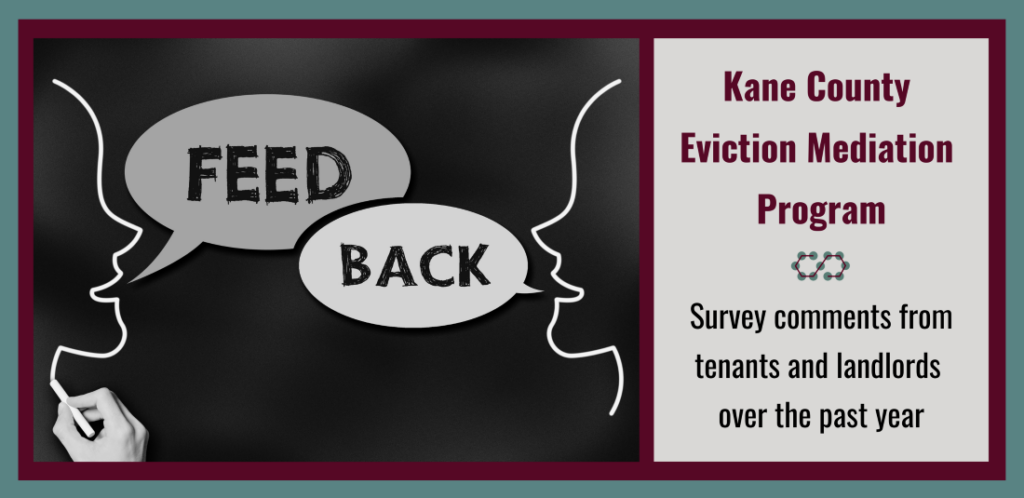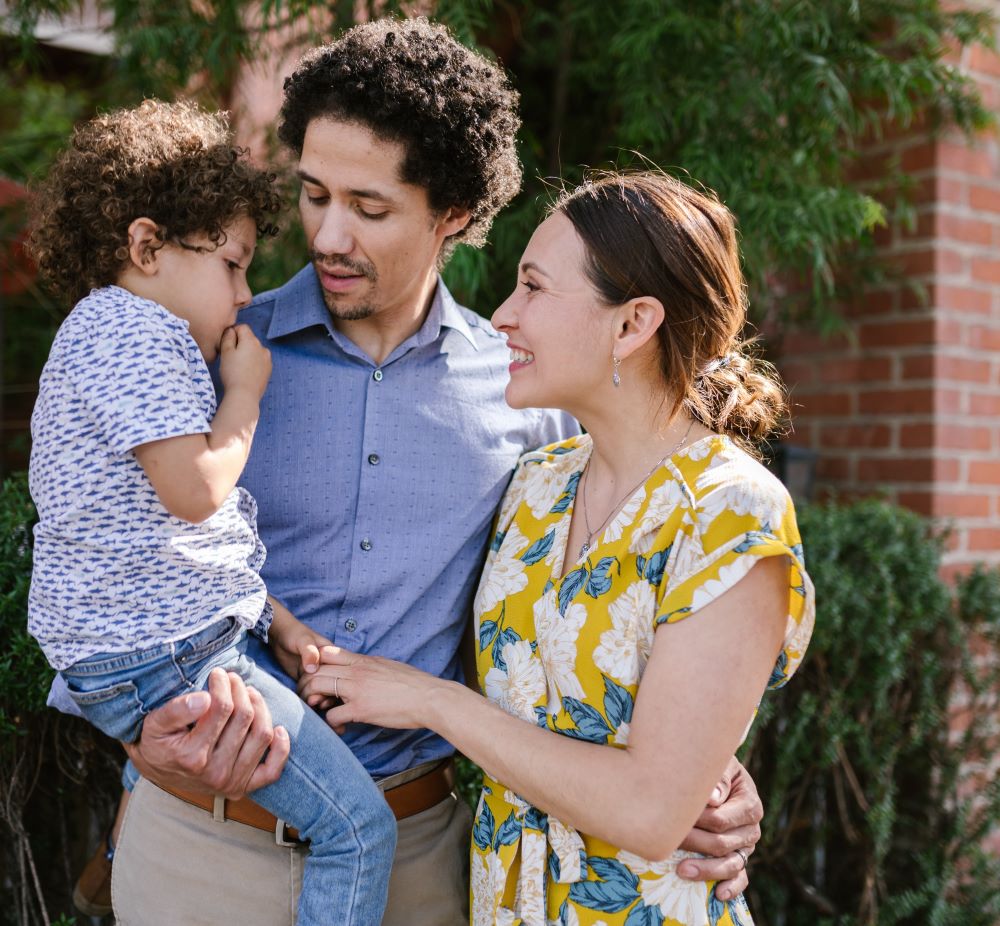In honor of Conflict Resolution Day on October 17 and the American Bar Association’s Mediation Week the third week of October, we are featuring a Q&A with RSI mediator Cathy McCoy. In addition to mediating for RSI, Cathy recently became our first volunteer at the Kane County Courthouse in Geneva, Illinois, supporting parties in the Kane County Eviction Mediation Program. RSI is grateful for Cathy’s contributions to our programs, and for the contributions of all of those who have mediated for our programs and other programs across the country and world!
When and why did you first become interested in being a mediator?
Using mediation-related skills has always been an informal part of my career working as a non-attorney guardian ad litem on behalf of children in Kane and DuPage counties in Illinois. I was involved with the Court Appointed Special Advocate (CASA) program for 20+ years, initially as a volunteer, then on staff as an Advocate Supervisor for the guardian ad litem programs both in Kane and DuPage counties. I retired from CASA in 2022. The role of CASA is to advocate for the best interests of children who have experienced abuse or neglect. CASA volunteers were encouraged to represent the “voice of the child” in court to help ensure that children are safe, have a permanent home and have an opportunity to thrive. Conflict between parties was a factor in every family that I encountered in the court system. Even though a formal mediation process was not always an option, the conflict I encountered in juvenile court proceedings highlighted the need to allow each party to have a say in the outcome of their court case. Discussing family conflicts in child protection matters allowed me to develop listening and communication skills to help parties to remain focused on child safety and well-being.
With the pandemic, courts were closed, so I found I had the time to further my education in two areas that interested me. Since I spent much of my time in court, I enrolled in a paralegal program to become more adept at preparing documents for the court and to gain a better understanding of the legal terminology. I then completed the 40-hour mediation training presented via Zoom by the Center for Conflict Resolution (CCR) in Chicago. A co-worker recommended the CCR mediation training, and I was excited to see that I didn’t need a law degree to participate!
Can you share a little about your history as a mediator with RSI’s programs?
Early on, I started working with the planning team at the inception of the Kane County Child Protection Mediation Program while I was working as a Guardian Ad Litem Supervisor with the CASA program in the juvenile court. I was fortunate to be able to participate in mediations as a representative of CASA, and later, after leaving the CASA program, I was able to step into the role of mediator in child protection disputes. In late May 2021, I started mediating with RSI in eviction court cases in Kane County.
What do you like about being a mediator?
I love interacting with families and have spent countless hours encouraging family members to put aside their differences and remain focused on the needs of the children. I have found that the mediation process provides an opportunity for the parties to express what is really important to them, to know that someone is listening, and to take a more active role in problem-solving. When I worked in the juvenile court, we spent a great deal of time talking with families in the hallway and waiting room outside court, and some of the best plans and discussions came during those hallway meetings. Shifting to mediation via Zoom after the pandemic allowed me to keep the conversations going, and families have been appreciative of the intervention.
Is there a type of mediation that you like best, and if so, why?
I enjoy eviction mediation because there are such varied situations, and the parties usually come to mediation prepared to take action to change their situation.
My other passion in mediation continues to be working with families when there are children involved in the court system. My specialty is working with guardians of children, with a focus on improving communication between parents and guardians about the needs and best interests of the children. It was disappointing when the child protection mediation program in Kane County ended. In order to continue the process, and in conjunction with court partners, I developed a pilot program for mediation in cases involving guardianship of minors in DuPage County, and the program has been steadily growing. If parties agree to participate, the Probate Guardianship Court judge refers pro se family members to mediation in order to resolve various conflicts involving children. This year, our Guardianship Family Engagement Mediation Program was awarded an Achievement Award from the National Association of Counties. The awards honor innovative, effective county government programs that strengthen services for residents and promote equal access to services.
Do you think that learning the tools of mediation has affected other aspects of your life? If so, how?
Mediation has truly changed the way I interact with everyone, even when it comes to communication with friends and family. I hope that family members would say my listening and communication skills have improved over the past few years!
What are some challenges with being a mediator?
Personally, one of the most challenging aspects was to put aside my assumptions and listen to the needs and interests of each participant. And at times difficult situations seem to arise when a participant does not want to be there or doesn’t trust the mediation process.
When did you start volunteering with RSI, and what do you do? What motivated you to start volunteering?
This is the first year that RSI has had a volunteer in court at the first appearance of parties in the Eviction Court. I greet people when they arrive and answer questions about mediation in general. If the judge refers their case to mediation, I speak with the parties afterward, gather contact information and explain the process and next steps.
I offered to volunteer because RSI staff understood the importance of having a person present when parties attend court in person. Parties are often nervous when they arrive; being in court can be intimidating, so greeting them in person seems to help. There is also an RSI staff member on Zoom attending court remotely so that every person present in court, either remotely or in person, has the ability to make a connection with the mediation program.
What inspires you to continue volunteering with the eviction mediation program?
I will be there as long as (RSI Eviction Mediation Program Manager) Chrissy (Wright) needs me! I find that interacting with parties before and after court provides insight into the needs and interests of parties in this type of court case. And, I love working with Chrissy, Brock, Kiasha and the folks at RSI. They have welcomed me as part of the team, and I have learned a great deal from them.
How do you think the Kane County Eviction Mediation Program is important to the community it serves?
I love that eviction mediation can benefit both tenants and landlords, both by shortening the time it takes to resolve their case and by reducing the stress level so that parties can focus on the future and make difficult decisions. Most importantly, mediation can help avoid evictions and provide a bit of stability during challenging times. I often work with pro se parties that express gratitude that RSI mediators help them understand the process and empower them to make decisions, when the expense of an attorney would be a financial burden. In addition, being able to participate in mediation remotely via Zoom has been a huge benefit to all parties. Attending mediation and court in person in Kane County can be difficult without access to transportation, given the layout of the county.





